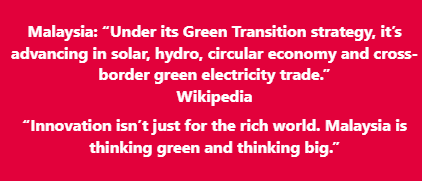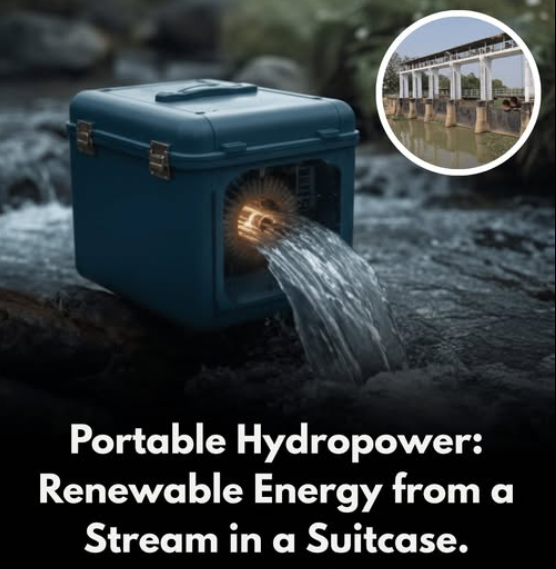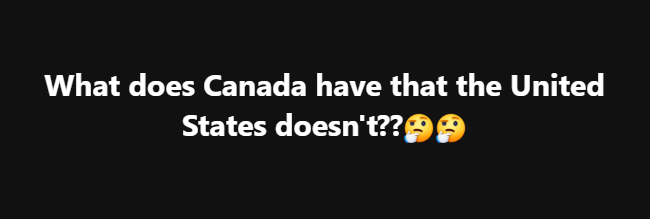 What Malaysia is doing with respect to renewable energy (see left) is a reminder of two things:
What Malaysia is doing with respect to renewable energy (see left) is a reminder of two things:
1) This planet will eventually achieve a sustainable approach to energy and transportation. The only open question is how much damage we will inflict in the process.
and
2) Big Oil can only hold on so long, before the scale of clean energy development makes solar, hydro, etc. so cheap that fossil fuels can no longer compete.
There is a white paper for sale online that purports to tell the reader “who will get hurt in oil/gas investment.” The obvious answer: anyone who owns stock in these companies when their price/share starts to spiral downward.
Renewable Energy
Renewable Energy Concepts Can’t Violate the Laws of Physics
 In the early days of 2GreenEnergy, my people and I were vigorously engaged in finding solid ideas in cleantech that needed funding in order to move forward.
In the early days of 2GreenEnergy, my people and I were vigorously engaged in finding solid ideas in cleantech that needed funding in order to move forward.
I vividly remember a conversation with a guy in Maryland who was trying to explain the (ostensible) breakthrough that he and his team had made in hydrokinetics. When I was having trouble visualizing what we was talking about, he asked me to “think of it as a river in a box.”
“Oh!” I exclaimed. “You mean you take a box full of standing water, add energy to it get it moving, then extract that energy, leaving you with more energy that you added to it.”
“Exactly.”
I politely explained that the laws of physics, specifically the first and second laws of thermodynamics, make this impossible.
He wasn’t through, however, and insisted that, in his office, his people had constructed a “working model.”
Here’s where my tone descended into something less than 100% polite. I told him that he may think he has a working model, but he’s wrong; if he believes this, he’s ignorant; if he doesn’t, but is conducting this conversation anyway, he’s a fraud.
“But don’t you want to come see it?” he implored.
“No. Not only would not fly across the country to see whatever it is you claim to have built, I wouldn’t walk across the street to a “working model” of something that is theoretically impossible.”
—
I tell this story because the claim made at the upper left is essentially identical. You’re pumping water up out of a stream, and then claiming to extract more energy when the water flows back into the stream.
Of course, social media today is rife with complete crap like this. We’ve devolved to a point where defrauding money out of idiots is rapidly replacing baseball as our national pastime.
Renewable Energy
What Canada Has that the U.S. Doesn’t
 Until recently, I would have moose, maple syrup, and frozen tundra.
Until recently, I would have moose, maple syrup, and frozen tundra.
Now I would say: decency, honesty, and class.
Renewable Energy
Not Sure About Zero Illegals, But . . .
 I’m ready to live in a country with zero hateful morons, if that counts.
I’m ready to live in a country with zero hateful morons, if that counts.
-
Greenhouse Gases7 months ago
Guest post: Why China is still building new coal – and when it might stop
-
Climate Change7 months ago
Guest post: Why China is still building new coal – and when it might stop
-

 Greenhouse Gases2 years ago
Greenhouse Gases2 years ago嘉宾来稿:满足中国增长的用电需求 光伏加储能“比新建煤电更实惠”
-
Climate Change2 years ago
Bill Discounting Climate Change in Florida’s Energy Policy Awaits DeSantis’ Approval
-
Climate Change2 years ago
Spanish-language misinformation on renewable energy spreads online, report shows
-

 Climate Change2 years ago
Climate Change2 years ago嘉宾来稿:满足中国增长的用电需求 光伏加储能“比新建煤电更实惠”
-
Climate Change Videos2 years ago
The toxic gas flares fuelling Nigeria’s climate change – BBC News
-

 Carbon Footprint2 years ago
Carbon Footprint2 years agoUS SEC’s Climate Disclosure Rules Spur Renewed Interest in Carbon Credits



